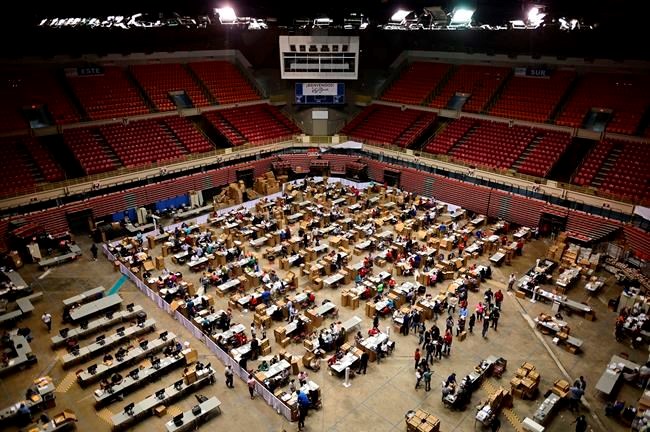SAN JUAN, Puerto Rico — Puerto Rico's two main political parties were in a tight gubernatorial race late Tuesday after voters stood in long lines and forced polling
Early results gave a slim lead to Pedro Pierluisi of the pro-statehood New Progressive Party, the territory’s former non-voting representative in Congress who briefly served as governor following huge street protests last year that led Gov. Ricardo Rosselló to resign. Carlos Delgado of the Popular Democratic Party, which supports the island’s territorial status, was a close second.
Less than 10,000 votes separated the top two candidates after counting of nearly 90% of the ballots cast Tuesday as well as some returns from early and absentee ballots, which were also still being counted.
Meanwhile, Jenniffer González, Puerto Rico's current representative in Congress, easily won a second term.
Lagging behind in the governor's race were Juan Dalmau of the Puerto Rican Independence Party, which for the first time since the 1950s obtained double-digit support, Alexandra Lúgaro of Citizen Victory Movement, César Vázquez of the Dignity Project and independent candidate Eliezer Molina.
The results trickled in just hours after voters armed with water, snacks and folding chairs fanned themselves as they waited under a harsh sun to cast their ballots Some arrived around dawn and waited up to three hours for
An elderly man slowly walked past one long line, raised his cane and shouted, “Let's vote for our homeland!” as those around him cheered.
Also on the ballot was the island’s sixth referendum on whether to change its current territorial status. It asked one question: “Should Puerto Rico be admitted immediately into the union as a state?” The vote is advisory as Congress would have to approve that happening. Statehood was leading with more than 50% of support and more than 80% of votes counted, according to early results.
As people still waited to vote, Puerto Rico's elections commission began posting early results until its
Among those last in line as the sun went down was Alma Alicea, a 41-year-old veterinarian.
“It's been a rough couple of years,” she said, explaining why she doesn't support either of the two main parties that have long dominated politics on the island. “There are better options this time around.”
The election attracted people including Miguel Ángel Velázquez, a 64-year-old handyman who remained indecisive until just days ago and said the candidate he chose has a platform he feels will boost the economy and help lift people out of poverty.
“The situation in general here in Puerto Rico is chaotic,” he said.
In the race to become the mayor of Puerto Rico's capital, three candidates are vying to replace San Juan Mayor Carmen Yulín Cruz, known for sparring with U.S. President Donald Trump after Hurricane Maria hit the island in September 2017, causing damages estimated at more than $100 billion and killing an estimated 2,975 people in its aftermath.
Less than two years after the storm, hundreds of thousands of Puerto Ricans took to the streets to demand the resignation of Rosselló in an event known as the “Summer of 2019,” a movement sparked by a leaked chat in which the then governor and other officials made fun of hurricane victims, among other things, and made comments that led to an investigation into possible corruption.
The new candidates are promising to fight corruption and turn the island around at a time of economic crisis and efforts to restructure a portion of Puerto Rico's more than $70 billion public debt, which officials declared unpayable in 2015.
Whoever wins will have to work alongside a federal control board that oversees Puerto Rico’s finances and has previously clashed with local officials over austerity measures, including proposed public pension cuts.
Candidates also face a dwindling voter base because of emigration caused by hardship. There are 2.36 million eligible voters, compared with 2.87 million in 2016 and 2.4 million in 2012.
Among those who voted was reggaeton superstar Bad Bunny, who is credited with encouraging young people to participate and generated a small buzz as he waited to cast his ballot, taking several selfies with other voters.
Some Puerto Ricans have welcomed the increasing diversity of parties and candidates in recent years, which has slowly eroded the grip that the New Progressives and Popular Democrats have had on the island’s politics for decades.
“We’re seeing some transformative years,” said Roberto Robles, a 21-year-old voting for the first time.
On Sunday, he stood near a stoplight in his hometown of Guayanilla, a community on the island's southwestern coast that was among the hardest hit by a series of damaging earthquakes that began late last December. He was alone and carried a poster that read, “Why would you choose the same thing? Vote," as cars around him honked in approval.
Political analyst Mario Negrón said he wasn’t surprised by the protests or the demand for new parties and faces as the island’s infrastructure deteriorates, administrations of the two main parties keep losing credibility and an exodus to the U.S. mainland continues.
“It’s obvious this was going to be the end product,” he said. “Puerto Rico’s public administration collapsed a long time ago. ... The question is, Now what?”
DáNica Coto, The Associated Press



